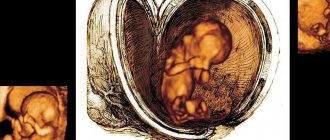At the same time that nausea and vomiting are left behind, a stable emotional background is established: attacks of irritability and sudden changes in mood fade into the background.
It is not surprising that the cycle between the first and second trimester of pregnancy is considered one of the most favorable for a woman in terms of well-being. At this time, you can safely travel, exercise, and take long walks.
Stay up to date with all the changes every week of pregnancy
Receive letters about the baby's development and the mother's condition once a week.
Preparing a woman's mammary glands leads to external and internal changes in the breasts. It becomes larger in volume, and the areola and nipples darken under the influence of hormones. The uterus increases several times from the moment of conception. At the 11th week of pregnancy, the belly does not protrude much, but the mother herself can feel its growth: clothes become tight and you want to wear something more spacious. Given that the uterus rises into the abdominal cavity, the pressure on the bladder is not as strong as before. In this regard, the number of visits to the ladies' room is significantly reduced.
Body changes and new sensations for women
We have already talked more than once about how breasts change during pregnancy.
Almost from the first days after conception, the mammary glands become engorged, the nipples and the skin around them darken, and a painful reaction to touch appears. And at week 11, colostrum discharge from the nipples is added to this. True, not all pregnant women discover the “prototype” of breast milk so early. Some people don't produce colostrum at all until after birth, which is also normal. It all depends on the functioning of female hormones. If you are already experiencing the appearance of colostrum, there is no need to worry. And even more so, there is no need to squeeze it out of the mammary glands. Just buy special pads at the pharmacy and insert them into your bra. Do your breasts hurt during pregnancy? The phenomenon, again, is completely natural - the muscles “push” the colostrum towards the nipples, which causes itching and painful “tingling” in the breasts. At week 11, a woman may also experience constipation and a tendency to heartburn. A pregnant woman becomes more distracted and forgetful. You can understand the woman’s state - her thoughts are now very far away (probably, at the moment she is more worried about what kind of eyes the unborn child will have, and not at all about debit and credit).
What to fear and what to do?
Despite the good results of the first screening, absolutely all expectant mothers need to remember about their well-being and the health of the child. If for some reason you still do not receive vitamin complexes, consult a gynecologist and start taking them immediately. Calcium, iodine, iron, and folic acid supplements are especially important at this stage of gestation; If there is a lack of progesterone, appropriate medications can be prescribed - orally or vaginally.
Do not forget about the need for adequate nutrition and providing yourself and the baby with oxygen in order to prevent fetal hypoxia. To enrich your blood with oxygen, try to drink ionized water or water from pure natural sources; take oxygen cocktails; take long walks to avoid stagnation in the pelvis; Do simple breathing exercises every day.
Use all possible methods to relieve anxiety: listen to melodic compositions and birdsong, contemplate artistic paintings, read positive literature, watch humorous programs and comedy films. Do some crafts, drawing or sculpting. If you don't have allergies, visit zoos more often and have contact with pets.
An alarming signal and a reason for an urgent visit to the gynecologist may be: increased toxicosis and swelling, rash on the body and face, the appearance of bloody or unpleasant-smelling discharge from the vagina, itching in the groin area, acute pain in the lower abdomen, sudden excessive hair loss, fever body, high or low blood pressure, exacerbation of chronic diseases. With a competent approach and timely consultation with a doctor, many conditions can be improved without leading to serious complications.
Tests and ultrasound
As a rule, at the 11th week of pregnancy, ultrasound screening of the fetus is performed for early detection of congenital malformations (Down syndrome, Edwards syndrome, neural tube defect). A biochemical blood test is also done the day before.
If the fetus does not develop properly, the doctor may suggest that the mother terminate the pregnancy. But you need to keep in mind that in 9% of cases screening gives a false positive result. So do not panic or make hasty decisions, and if you find any anomalies, be sure to consult with other specialists. Most likely, you will be prescribed additional tests.
Visiting an obstetrician-gynecologist
Visiting the doctor at 11 weeks pregnant
At the 11th week of pregnancy, you need to go to an appointment with a gynecologist if the woman has not yet registered.
For some pregnant women, the doctor prescribes an appointment at this time to ensure a favorable course of pregnancy.
At an appointment with a gynecologist, women who have not previously registered receive referrals for blood and urine tests, which must be taken as soon as possible.
Mandatory are:
- blood: general and detailed analysis from a finger;
- biochemical analysis from a vein;
- finger prick test for sugar to determine blood type and Rh factor;
- vein test for sexually transmitted diseases.
At the doctor's appointment:
- measures blood pressure;
- body temperature;
- measure height, weight, hip circumference;
- enter the pregnant woman’s medical history data into a special journal (exchange card);
- will ask and enter into the exchange card data on the length of the cycle, the age at which sexual activity began, the number of previous pregnancies and their outcome (childbirth, miscarriage, ectopic pregnancy, abortion, vacuum, etc.).
In addition, the gynecologist will refer the woman for examination to a dentist, therapist, cardiologist, endocrinologist, otolaryngologist, or ophthalmologist.
It is advisable to undergo an examination by specialized specialists before 12 weeks of pregnancy (according to obstetric calculations).
For women with suspected pregnancy complications or severe manifestations of toxicosis, the gynecologist may schedule an appointment at the 11th week of pregnancy. Usually the date falls on the next day after the first scheduled ultrasound.
This is done to exclude possible developmental defects in the fetus and to timely identify a non-viable embryo.
Termination of pregnancy without medical justification is possible only up to 12 weeks.
If the period is longer, then the procedure requires the use of more complex instruments, and the risk of disrupting the woman’s reproductive system increases significantly.
At the appointment, the doctor will evaluate the ultrasound readings, tests and listen to the pregnant woman’s complaints.
Additionally, blood pressure and temperature will be measured, and if necessary, a chairside examination will be performed. Based on the results of the assessment, the gynecologist will give recommendations and set a date for the next appointment. If everything is fine, then the meeting with the doctor will happen in 2 weeks.
If complications are detected, depending on the complexity of the situation, an earlier appointment, outpatient treatment, or a recommendation for hospitalization may be issued.
At the 11th week of pregnancy, you should completely trust the doctor’s prescriptions.
If a woman feels well, and the doctor convinces her of the need for inpatient treatment, it is strongly recommended to listen to a specialist.
Ultrasound and tests
At 11 weeks of pregnancy, many women undergo their first routine ultrasound. It is carried out for early detection of pathologies in the fetus.
During screening, the doctor measures:
- the length of the fetal body from the coccyx to the top of the head (crown). In the documents it is designated as KTR. This indicator gives an understanding of how timely the unborn baby develops and whether its size corresponds to the gestational age;
- thickness of the collar space. This indicator can tell how likely the fetus is to have genetic abnormalities (Down and Patau syndromes). In the documents, this indicator is called TVP; normally it should not exceed 2.7 mm;
- head circumference (HC);
- symmetry of brain parts, their location;
- the degree of development of all parts of the body, the presence of all internal organs and systems;
- fetal heart rate (HR) and their compliance with standards;
- thickness and location of the chorion (membrane membrane);
- volume of amniotic fluid;
- condition of the pharynx and cervix.
On the day of the ultrasound, you must measure your height and weight. The diagnostician will need them for correct calculations.
Triple test
Usually on the day of an ultrasound, a woman is sent for an additional biochemical blood test, the so-called triple test. This is one of the main indicators of the first pregnancy screening.
In blood taken from a vein of a pregnant woman, the level of:
- pregnancy hormone (hCG);
- alpha-fetoprotein protein;
- estriol.
The obtained indicators are checked against the exact duration of pregnancy and can tell a lot about its course: the timeliness of fetal development, the presence of genetic pathologies, the state of the mother’s body.
Deciphering this analysis may take several days, and as a result, the woman may be invited to consult a specialist.
Do not worry too much before your appointment; screening results do not provide a 100% guarantee and can only indicate possible problems.
If there is a suspicion of pathologies in the fetus, the woman will be prescribed additional tests to confirm the diagnosis.
Uterus and belly
At the 11th week of pregnancy, the uterus continues to grow steadily.
At the current stage, it has filled almost the entire space in the abdominal cavity and is gradually beginning to bulge just below the navel. Feels good when palpated.
As a consequence of the increase in the size of the uterus, the abdomen begins to grow. So far this is a slightly noticeable protrusion of the anterior abdominal wall.
The growth of the uterus is most noticeable in women with low body weight.
Pain in the abdomen and other parts of the body
At the 11th week of pregnancy, many women experience discomfort and pain in different parts of the body.
To avoid undesirable consequences, you need to have a good understanding of which pains are normal and which are a sign for an emergency visit to a gynecologist.
Lower back pain
Unpleasant sensations in the back, mild pain in most cases indicate the tone of the uterus.
If a symptom appears after physical activity, this is normal.
If the discomfort is persistent or intensifies, you should consult a gynecologist.
Stomach ache
Normally there should be no abdominal pain.
Minor unpleasant pulling sensations caused by the growth of the uterus are acceptable.
If there is severe pain that gradually increases and intensifies when pressed, you need to urgently contact an ambulance.
Leg pain
At the 11th week of pregnancy, the amount of calcium absorbed by the fetus increases greatly.
If a woman’s diet lacks this substance, severe pain in the legs may occur.
To reduce their manifestation, you need to consult a gynecologist for advice.
Headache
During the current period, some pregnant women experience periodic headaches. This is caused by a lack of oxygen in a woman's body. You cannot take painkillers.
It is advisable to increase the number of walks in the fresh air, drink more clean water, and consult a gynecologist.
Pain in the anus
The uterus becomes larger and rises into the abdominal cavity, putting pressure on the intestines and arteries that supply the lower part of the body.
Quite often, at the 11th week of pregnancy, women begin to experience discomfort or pain in the anus, and an exacerbation of hemorrhoids is noted.
Treatment of this condition should be strictly under the supervision of a gynecologist; even medications tested before pregnancy should not be taken.
Discharge
Normally, at the 11th week of pregnancy, vaginal discharge should be light (milky or white) with a slight odor. The amount of discharge may vary.
You need to be wary and consult a doctor if vaginal discharge:
- changed color. Became yellow, green, red, brown;
- strange consistency: curd-like, with flakes;
- have a pungent, unpleasant odor;
- discharge with pus appeared.
Bleeding and menstruation
In the 11th week of pregnancy, there should be no bleeding or menstruation if the pregnancy progresses well.
If a woman notices this symptom, it is necessary to urgently contact an ambulance; a spontaneous miscarriage is possible.
Nutrition at 11 weeks of pregnancy
To prevent constipation, a woman should drink at least two liters of water per day. Doctors do not recommend expectant mothers to drink coffee, strong tea, carbonated drinks - replace them with clean plain water, fruit drinks, and freshly squeezed juices from seasonal vegetables and fruits. As for alcohol, it is strictly prohibited!
In order not to further increase the discomfort of heartburn, exclude spicy foods, pickled foods, sour vegetables, citrus fruits, chocolate, various sauces and mayonnaise from your diet.
Overeating is also not recommended now. It is better to eat small portions 5-6 times a day. The future mother's diet should contain the following products: meat (preferably dietary), fish, cereals, dairy products, berries, vegetables, fruits and herbs. Avoid spicy, fried, fatty foods, pickled foods and processed foods.
What happens in the body
At the eleventh week of pregnancy, the fetus, and therefore the uterus, grows quite rapidly.
This, of course, affects your feelings. What to do? You should not wear tight clothing, especially make sure that there is no pressure of clothing in the abdominal area. The good news is that thanks to progesterone and estrogen, your breasts are growing every day. The bad news: changes in appearance often lead to the appearance of stretch marks, particularly in the chest, abdomen and thighs. What to do? Buy a stiff washcloth. Do a massage in the shower: massage problem areas with gentle circular movements.
Sometimes, for some expectant mothers, the digestion process slows down, which is why constipation may occur. There is no way to allow the overcrowded rectum to put pressure on the uterus, preventing the child from developing. What to do? Drink a glass of water on an empty stomach in the morning and kefir at night. No laxatives or enemas - they increase the tone of the uterus!
Lifestyle
By the 11th week, a woman’s priorities change - now everything is subordinated to caring for the child. But this does not mean that life has stopped! Expectant mothers still work, they communicate with their colleagues, visit sports clubs, go to concerts... However, every time they must mentally ask themselves the question: “How will what I am doing at the moment affect the development of my son or daughter? ? Therefore, there is no need now to get involved in a serious argument with your boss (better remain silent!), lift weights in the gym or get a new tattoo. Sleep more, walk in the fresh air, listen to calm music. Don't take risks and don't worry about trifles!
Intimate life
Intimate life is possible at any stage of pregnancy, and the 11th week is no exception. It is important to take into account the general well-being of the expectant mother. If there are ailments or a threat of termination of pregnancy, confirmed by a gynecologist, it is best to wait and postpone intimacy with your partner until complete recovery. If a woman feels well, then there is no reason to interrupt an intimate relationship. Quite the contrary, it has been proven that regular sex life has a positive effect on a woman’s body.










